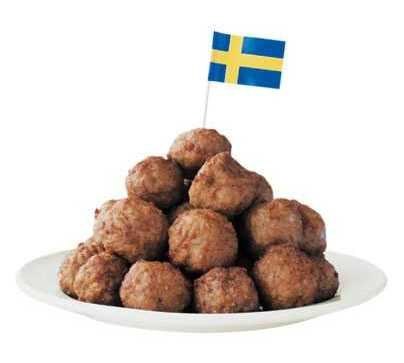
IKEA is halting sales of its once wedding-worthy meatballs following the discovery that samples of the traditional Swedish dish contained horsemeat, making the home products company the most recent in a string of major firms drawn into the growing scandal.
THE PROBLEM: While everyone from the CEO of ASDA to David Cameron have gone to lengths to allay concerns about health and safety, many consumers have nevertheless felt they’ve been cruelly misled. Europe Minister and Conservative MP David Lidington summed up some of the frustration at the heart of the crisis anecdotally in an article for The Bucks Herald, “I did once eat fried donkey for lunch…I’ve never been offered horse but nor would I have any ethical objection to eating it. But I do want to know what it is that I am eating and expect descriptions, whether on a label or a menu, to be accurate (...)"
Blame for the scandal has been lobbed in a number of directions, including at the EU meat ban, Romanian road rules, and bullying culture.
Who do you blame? Has this story changed your long-term view of any of these organisations?
1. Food Suppliers
The Swiss food giant Nestle reported that there was no horsemeat in its UK products, but there were levels of horsemeat “above the 1% threshold the UK's Food Standards Agency uses to indicate likely adulteration or gross negligence (...)" in products sold in France and Spain.
Add ratingDescriptionWrite opinion
Finnish company Findus was first drawn into the fray when it was revealed that its beef lasagne contained as much as “100% horsemeat”. The firm has since reportedly asked for authorization to follow the German development minister’s advice and donate its products containing horse to the poor.
Add ratingDescriptionWrite opinion
Sales of spaghetti bolognese, shepherd's pie and beef lasagne ready meals were halted by Birds Eye when testing found horse DNA in a chilli con carne sold in Belgium.
Add ratingDescriptionWrite opinion
Finally Burger King is the only fast food giant (so far) to be caught up in the issue, after “very small trace levels (...)"of horse meat contamination were found in beef from Silvercrest, a supplier Burger King said they would no longer use.
Add ratingDescriptionWrite opinion
2. Food Sellers
Supermarket giant Tesco can be found at the genesis of the media storm, after it was found that horse meat accounted for 29% of Tesco’s own Everyday Value Beef Burgers.
Add ratingDescriptionWrite opinion
Aldi, Lidl and Iceland quickly pulled frozen burgers from the shelves that had originated from the same supplier.
Add ratingDescriptionWrite opinion
Add ratingDescriptionWrite opinion
Add ratingDescriptionWrite opinion
After one supplier reported beef containing as much as 80% horse, ASDA had to quit sales of some products. ASDA’s boss attempted to restore customers’ trust by assuring “rigorous testing” but admitted that he couldn’t be sure the changes would not affect prices.
Add ratingDescriptionWrite opinion
IKEA announced today that it would withdraw "meatballs from sale in 14 European countries after tests in the Czech Republic found traces of horsemeat in a batch made in Sweden (...)"
Add ratingDescriptionWrite opinion
3. Politicians and Regulators
Fingers have also been pointed at the UK politicians and agencies most closely involved with food regulation and managing the government response. The Sun called Environmental Minister and Conservative MP Owen Paterson’s response to the crisis “hapless” and “flatfooted (...)"as Paterson travelled to Belgium to meet with EU leaders about the crisis. Christopher Booker defended the minister in The Telegraph: ”He saw what needed to be done and he marshalled all the key players, right up to the time when he instigated a top-level emergency meeting in Brussels on Wednesday evening (...)" One former chief adviser placed blame on Paterson and the government for “disembowelling (...)" the Food Standards Agency, the government food watchdog.
Add ratingDescriptionWrite opinion
Add ratingDescriptionWrite opinion
Add ratingDescriptionWrite opinion
What have we missed?
Add your view on this particular story, as well as interesting opinion links we missed, in the discussion area below!




















